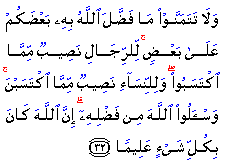Battle Between Sexes, Principles of Organising, Safeguarding Physical Needs
Issue 229 » July 4, 2003 - Jumada-al-Awwal 4, 1424
General
| Living the Quran |
Al-Nisa
(Women) Don't Feel Sorry for Yourself Tamanni (coveting) in the Islamic sense is to wish that one be given what another has in his possession, such as, wealth, a house, a beautiful spouse and so on. A believer should appeal to God and pray to Him to grant him of His grace. He should not waste time feeling sorry for himself nor with all that such an attitude generates of harbouring grudges and greed, of feeling angry, deprived, or unjustly treated. Such feelings may give rise to thinking ill of God and His fair distribution. Achieving Peace and Tranquility This verse embodies a very important directive. By heeding it, man would be able to achieve a great measure of peace and tranquility. God has not created all humans alike. Some are handsome while others are ugly. The voices of some are sweet and those of others repulsive. Some are physically strong others are weak. It is this diversity which gives variety to human civilization, and hence serves a useful purpose. Whenever man superimposes distinctions of his own over and above this natural inequality he disrupts the natural order of things, and paves the way for corruption. Futile Age Old Battle Between Sexes Umm Salamah, a wife of the Prophet, once said to him: "Messenger of God, men fight when we do not, and we receive half a share of inheritance." God subsequently revealed the above verse. When we consider the Islamic system as a whole and then consider that particular aspect which organises relationships between the two parts of the single soul from which both men and women have been created, we find no room for such ancient arguments of the type mentioned in the report quoted above. It is useless and futile to try to depict matters as if a raging battle is going on between the two sexes in which points and victories are scored. The attempt by some serious writers to discredit women and to attribute all sorts of vices to them is equally futile, whether it is made in the name of Islam or under the guise of scholarly analysis. There is no question of battle whatsoever. There are simply differences of characteristics and potentials. Differences in the proper distribution of tasks and specialties which achieves both complementarity and absolute justice, as can only be expected from the Divine Method. Source: |
| Understanding the Prophet's Life |
General Islamic Principles of Organising What are the organising principles that can bring people together for working to realise the vision of Islam in society and the world? Regarding this, the Prophet Muhammad has offered some guidelines and principles. In one of his famous saying, he stated:
Source: |
| The Islamic Civilization |
Safeguarding Physical Needs Muslims established their first ever hospital during the period of Walid ibn Abd al-Malik, which was meant exclusively for leprosy patients. Hospitals were of two kinds - mobile dispensaries and permanent buildings. One such mobile dispensary is traceable to the period of the Prophet, peace be upon him, and was established during the Battle of the Trench. In this battle, a separate tent was erected for the wounded. Later on Caliphs and the rulers developed and extended them to the extent that all the requirements of patients ranging from medical care, diet, medicines, clothes, physicians and pharmacists were provided. These mobile hospitals moved from village to village where there were no permanent hospitals. During the reign of Sultan Muhammad Saljuqi, the mobile hospital had become so large that forty camels carried its equipment. As for the permanent hospitals, they were in such large numbers that every big and small town benefited from them. Even the smallest town boasted of more than one hospital. For example, Cordoba alone had fifty major hospitals. It should also be kept in mind that every large hospital had a library for the benefit of both the students and physicians. It is said that the Ibn Tulun Hospital of Egypt had a library comprising 100,000 books on various branches of medical science. The portals of these hospitals were open to everybody and no fees of any kind were charged. No distinction was made between the poor and the rich, related and the stranger, local and foreign, common man and distinguished person. Source: |
